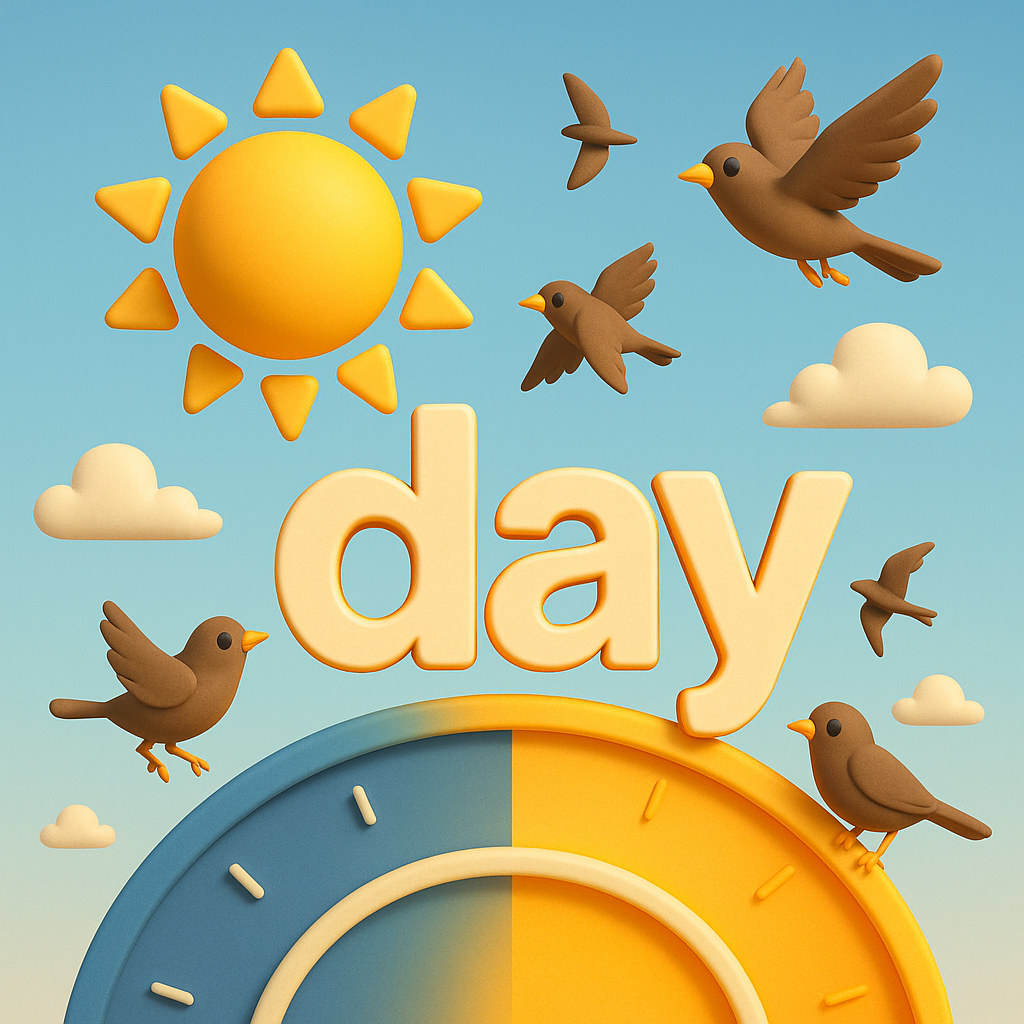Day
Definition
Day refers to a 24-hour period, typically from midnight to midnight, and includes both daytime and nighttime. It is also used to describe the period of daylight between sunrise and sunset or any specific date or occasion.
Parts of Speech
- Noun
Pronunciation
American English
- IPA Pronunciation: /deɪ/
- Respelling: day
British English
- IPA Pronunciation: /deɪ/
- Respelling: day
Etymology
The word "day" originates from the Old English "dæg," which can be traced back to Proto-Germanic "dagaz," meaning "day" or "daylight." This root is shared across Germanic languages and is related to the concept of daylight or a 24-hour cycle.
Derivatives
- Daily (adjective/adverb)
- Daylight (noun)
- Midday (noun)
- Daytime (noun)
- Daylong (adjective)
Synonyms
- Period
- Date
- Interval
Antonyms
- Night
- Darkness
- Eternity
Usage
The term "day" is frequently used to refer to the 24-hour cycle that includes daytime and nighttime. For example, "Each day starts at midnight and ends at the following midnight." It can also refer to a specific time or event, such as "Graduation day is a special occasion."
Related Terms
- Night: The period of darkness between sunset and sunrise.
- Week: A period of seven consecutive days.
- Calendar: A system for organizing and recording dates and events.
Detailed Definitions
Noun
- A 24-hour period from midnight to midnight: Refers to the full daily cycle used in timekeeping.
- Example: "She worked all day and rested at night."
- The period of daylight between sunrise and sunset: Refers to the time when the sun is visible.
- Example: "The birds are active during the day."
- A particular date or occasion: Used to signify a specific event or time of importance.
- Example: "The opening day of the festival was a success."
day



🇨🇳 Mandarin (Simplified Chinese)
- 天
- IPA: /tiān/
- Respelling: tyan
🇮🇳 Hindi
- दिन
- IPA: /d̪ɪn/
- Respelling: din
- दिवस
- IPA: /d̪ɪ.ʋəs/
- Respelling: divas
🇪🇸 Spanish
- día
- IPA: /ˈdi.a/
- Respelling: dee-a
🇫🇷 French
- jour
- IPA: /ʒuʁ/
- Respelling: zhoor
🇸🇦 Modern Standard Arabic
- يوم
- IPA: /jʊm/
- Respelling: yum
- نهار
- IPA: /naːħaːr/
- Respelling: naahar (often used to refer to daytime)
🇧🇩 Bengali
- দিন
- IPA: /d̪in/
- Respelling: din
🇷🇺 Russian
- день
- IPA: /djɛnʲ/
- Respelling: dyen'
🇵🇹 Portuguese
- dia
- IPA: /ˈdi.ɐ/
- Respelling: dee-ah
🇮🇩 Indonesian
- hari
- IPA: /ˈhari/
- Respelling: hah-ree
🇩🇪 German
- Tag
- IPA: /taːk/
- Respelling: taak
🇯🇵 Japanese
- 日
- IPA: /hi, ni/
- Respelling: hee, nee
🇻🇳 Vietnamese
- ngày
- IPA: /ŋaːj˨˩/
- Respelling: ngaai
🇰🇷 Korean
- 날
- IPA: /nal/
- Respelling: nal
🇹🇷 Turkish
- gün
- IPA: /ɟyn/
- Respelling: gyoon
🇵🇰 Urdu
- دن
- IPA: /d̪ɪn/
- Respelling: din
- روز
- IPA: /roːz/
- Respelling: roz





